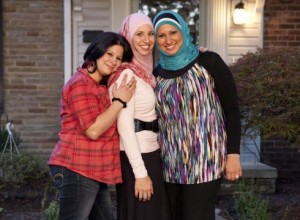TLC’s All-American Muslim, which I previewed last week, aired last night in the United States. The show features a group of mostly Lebanese American Muslims from Dearborn, Michigan as they go about their lives. There has been a stream of reviews, mostly positive from mainstream media outlets and ones that are more questioning by Muslim writers. Regardless of the critiques, the show is the first of its kind to feature an American Muslim community to a large viewing audience.
The women portrayed in the show’s first two episodes include one woman who is marrying an Irish-Catholic man who converts, her outspoken (and unmarried) older sister, a woman struggling with infertility (the middle sister), a pregnant relatively newlywed, and an event planner who dreams of opening a nightclub. There are other women who appear as well, but whose roles were not featured to as large an extent as those mentioned here.
Marriage, childbearing, the ability to become pregnant, and one woman’s desire to open a nightclub in opposition of what is expected of her become the emphasis for women on the show. What about their relationships with non-Muslims, their career or academic aspirations, or what they value and find inspiring in life at the end of the day? What does it mean to be Muslim? What does it mean to be American?

The more time I spent considering these questions since watching the first couple of episodes, I realized that this wasn’t the show’s aim. Instead, the focus here is on presenting the “everyday” (as Porochista Khakpour reviews in The New York Times) and “ordinariness” (as The Atlantic’s Alyssa Rosenberg described) in how Muslim American experience does not differ from conventional non-Muslim American experience.
Uzma Kolsy for the American Prospect eloquently writes about the challenge of presenting American Muslims from a single community:
The show’s ambition to provide an encompassing portrayal of an entire faith community takes it into risky territory…While a segment of Islam is portrayed on the screen, a show about ethnicity or culture, along the lines of Jersey Shore, might have been a more apt premise for the series. Through its effort to normalize a community and promote tolerance, All-American Muslim could end up exoticizing Islam.
While the women on the show are diverse in their appearance (hijab/nonhijab wearing), I was curious about their actual practice. Their faith appeared to be a reflection of their family’s faith or apparent through wearing the hijab, and there were times I noted the conflation of cultural practices with religious ones (will non-Muslim viewers notice this? Or care?).
I found myself comparing the Muslim women from the show to other American Muslim women I’ve profiled at MMW in the past: Ameena Mathews from The Interrupters, the new Americans in Maxamuud’s Nomad Diaries. The characters here were not defined by the titles of their film or book, respectively, and included long reflections of interacting with their communities (who are often non-Muslim) in addition to looking at their own personal forms of religious expression (strangely enough, I can’t recall any of the women from the film engaging in religious expression, besides a discussion on hijab).
Is it better to show Muslims in standalone series that emphasize their faith? Or include them as characters alongside non-Muslims? Which will be more effective in combatting stereotypes and negative portrayals in mainstream media? While the show will, no doubt, be an entry point for understanding and awareness of American Muslims for countless viewers, what will be the cost of presenting them through an Arab-American community and presenting American Muslim women overwhelmingly through their marital, familial, and childbearing experiences?
All-American Muslim is an eight-part series that airs weekly on TLC in the United States.











